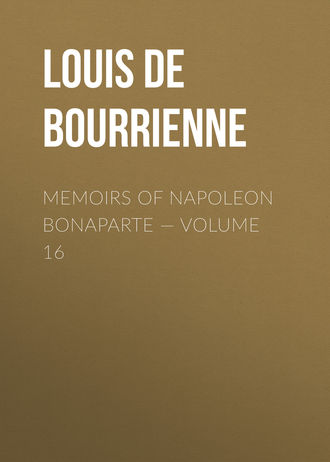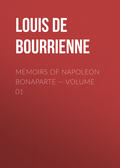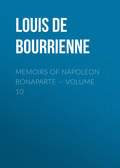
Louis de Bourrienne
Memoirs of Napoleon Bonaparte — Volume 16
Napoleon seems to have felt that he had been too violent in his conduct. He admitted, when at table with his suite a few days after, that he had behaved very ill, and that in any other situation he should blush for what he had done. "I could have wished, for his sake," he said, "to see him evince a little anger, or pull the door violently after him when he went away." These few words let us into a good deal of Napoleon's character: he liked to intimidate, but his vehement language was received with a calmness and resolute forbearance to which he was quite unaccustomed, and he consequently grew more angry as his anger was less regarded.
The specimens here given of the disputes with Sir Hudson Lowe may probably suffice: a great many more are furnished by Las Cases, O'Meara, and other partisans of Napoleon, and even they always make him the aggressor. Napoleon himself in his cooler moments seemed to admit this; after the most violent quarrel with the Governor, that of the 18th of August 1816, which utterly put an end to anything like decent civility between the parties; he allowed that he had used the Governor very ill, that he repeatedly and purposely offended him, and that Sir Hudson Lowe had not in a single instance shown a want of respect, except perhaps that he retired too abruptly.
Great complaints were made of the scanty way in which the table of the exiles was supplied; and it was again and again alleged by them that they had scarcely anything to eat. The wine, too, was said to be execrable, so bad that in fact it could not be drunk; and, of such stuff as it was, only one bottle a day was allowed to each person—an allowance which Las Cases calls ridiculously small. Thus pressed, but partly for effect, Napoleon resolved to dispose of his plate in monthly proportions; and as he knew that some East India captains had offered as much as a hundred guineas for a single plate, in order to preserve a memorial of him, he determined that what was sold should be broken up, the arms erased, and no trace left which could show that they had ever been his. The only portions left uninjured were the little eagles with which some of the dish-covers were mounted. These last fragments were objects of veneration for the attendants of Napoleon they were looked upon as relics, with a feeling at once melancholy and religious. When the moment came for breaking up the plate Las Cases bears testimony to the painful emotions and real grief produced among the servants. They could not, without the utmost reluctance, bring themselves to apply the hammer to those objects of their veneration.
The island of St. Helena was regularly visited by East India ships on the return voyage, which touched there to take in water, and to leave gunpowder for the use of the garrison. On such occasions there were always persons anxious to pay a visit to the renowned captive. The regulation of those visits was calculated to protect Napoleon from being annoyed by the idle curiosity of strangers, to which he professed a great aversion. Such persons as wished to wait upon him were, in the first place, obliged to apply to the Governor, by whom their names were forwarded to Count Bertrand. This gentleman, as Grand-Marshal of the household, communicated the wishes of those persons to Napoleon, and in case of a favourable reply fixed the hour for an interview.
Those visitors whom Napoleon admitted were chiefly persons of rank and distinction, travellers from distant countries, or men who had distinguished themselves in the scientific world, and who could communicate interesting information in exchange for the gratification they received. Some of those persons who were admitted to interviews with him have published narratives of their conversation, and all agree in extolling the extreme grace, propriety, and appearance of benevolence manifested by Bonaparte while holding these levees. His questions were always put with great tact, and on some subject with which the person interrogated was well acquainted, so as to induce him to bring forth any new or curious information of which he might be possessed.
Captain Basil Hall, in August 1817, when in command of the Lyra, had an interview with the Emperor, of whom he says: "Bonaparte struck me as differing considerably from the pictures and busts' I had seen of him. His face and figure looked much broader and more square—larger, indeed, in every way than any representation I had met with. His corpulency, at this time universally reported to be excessive, was by no means remarkable. His flesh looked, on the contrary, firm and muscular. There was not the least trace of colour in his cheeks; in fact his skin was more like marble than ordinary flesh. Not the smallest trace of a wrinkle was discernible on his brow, nor an approach to a furrow on any part of his countenance. His health and spirits, judging from appearances, were excellent, though at this period it was generally believed in England that he was fast sinking under a complication of diseases, and that his spirits were entirely gone. His manner of speaking was rather slow than otherwise, and perfectly distinct; he waited with great patience and kindness for my answers to his questions, and a reference to Count Bertrand was necessary only once during the whole conversation. The brilliant and sometimes dazzling expression of his eye could not be overlooked. It was not, however, a permanent lustre, for it was only remarkable when he was excited by some point of particular interest. It is impossible to imagine an expression of more entire mildness, I may almost call it of benignity and kindness, than that which played over his features during the whole interview. If, therefore he were at this time out of health and in low spirits, his power of self-command must have been even more extraordinary than is generally supposed, for his whole deportment, his conversation, and the expression of his countenance indicated a frame in perfect health and a mind at ease."
The manner assumed by Napoleon in the occasional interviews he had with such visitors was so very opposite to that which he constantly maintained towards the authorities in whose custody he was placed, that we can scarcely doubt he was acting a part in one of those situations. It was suggested by Mr. Ellis that he either wished, by means of his continual complaints, to keep alive his interest in England, where he flattered himself there was a party favourable to him, or that his troubled mind found an occupation in the annoyance which he caused to the Governor. Every attempt at conciliation on the part of Sir Hudson Lowe furnished fresh causes for irritation. He sent fowling-pieces to Longwood, and the thanks returned were a reply from Napoleon that it was an insult to send fowling-pieces where there was no game. An invitation to a ball was resented vehemently, and descanted upon by the French party as a great offence. Sir Hudson Lowe at one time sent a variety of clothes and other articles received from England which he imagined might be useful at Longwood. Great offence was taken at this; they were treated, they said, like paupers; the articles, ought to have been left at the Governor's house, and a list sent respectfully to the household, stating that such things were at their command if they wanted them.
An opinion has already been expressed that much of this annoyance was due to the offended pride of Napoleon's attendants, who were at first certainly far more captious than himself. He admitted as much himself on one occasion in a conversation with O'Meara. He said, "Las Cases certainly was greatly irritated against Sir Hudson, and contributed materially towards forming the impressions existing in my mind." He attributed this to the sensitive mind of Las Cases, which he said was peculiarly alive to the ill-treatment Napoleon and himself had been subjected to. Sir Hudson Lowe also felt this, and remarked, like Sir George Cockburn, on more than one occasion, that he always found Napoleon himself more reasonable than the persons about him.
A fertile source of annoyance was the resolution of Napoleon not upon any terms to acknowledge himself a prisoner, and his refusal to submit to such regulations as would render his captivity less burdensome. More than once the attendance of an officer was offered to be discontinued if he would allow himself to be seen once every day, and promise to take no means of escaping. "If he were to give me the whole of the island," said Napoleon, "on condition that I would pledge my word not to attempt an escape, I would not accept it; because it would be equivalent to acknowledging myself a prisoner, although at the same time I would not make the attempt. I am here by force, and not by right. If I had been taken at Waterloo perhaps I might have had no hesitation in accepting it, although even in that case it would be contrary to the law of nations, as now there is no war. If they were to offer me permission to reside in England on similar conditions I would refuse it." The very idea of exhibiting himself to an officer every day, though but for a moment, was repelled with indignation. He even kept loaded pistols to shoot any person who should attempt an intrusion on his privacy. It is stated in a note in O'Meara's journal that "the Emperor was so firmly impressed with the idea that an attempt would be made forcibly to intrude on his privacy, that from a short time after the departure of Sir George Cockburn he always kept four or five pairs of loaded pistols and some swords in his apartment, with which he was determined to despatch the first who entered against his will." It seems this practice was continued to his death.
Napoleon continued to pass the mornings in dictating his Memoirs and the evenings in reading or conversation. He grew fonder of Racine, but his favourite was Corneille. He repeated that, had he lived in his time, he would have made him a prince. He had a distaste to Voltaire, and found considerable fault with his dramas, perhaps justly, as conveying opinions rather than sentiments. He criticised his Mahomet, and said he had made him merely an impostor and a tyrant, without representing him as a great man. This was owing to Voltaire's religious and political antipathies; for those who are free from common prejudices acquire others of their own in their stead, to which they are equally bigoted, and which they bring forward on all occasions. When the evening passed off in conversation without having recourse to books he considered it a point gained.
Some one having asked the Emperor which was the greatest battle that he had fought, he replied it was difficult to answer that question without inquiring what was implied by the greatest battle. "Mine," continued he, "cannot be judged of separately: they formed a portion of extensive plans. They must therefore be estimated by their consequences. The battle of Marengo, which was so long undecided, procured for us the command of all Italy. Ulm annihilated a whole army; Jena laid the whole Prussian monarchy at our feet; Friedland opened the Russian empire to us; and Eckmuhl decided the fate of a war. The battle of the Moskwa was that in which the greatest talent was displayed, and by which we obtained the fewest advantages. Waterloo, where everything failed, would, had victory crowned our efforts, have saved France and given peace to Europe."
Madame Montholon having inquired what troops he considered the best, "Those which are victorious, madam," replied the Emperor. "But," added he, soldiers are capricious and inconstant, like you ladies. The best troops were the Carthaginians under Hannibal, the Romans under the Scipios, the Macedonians under Alexander, and the Prussians under Frederick." He thought, however, that the French soldiers were of all others those which could most easily be rendered the best, and preserved so. With my complete guard of 40,000 or 50,000 men I would have undertaken to march through Europe. It is perhaps possible to produce troops as good as those that composed my army of Italy and Austerlitz, but certainly none can ever surpass them."
The anniversary of the battle of Waterloo produced a visible impression on the Emperor. "Incomprehensible day!" said he, dejectedly; "concurrence of unheard-of fatalities! Grouchy, Ney, D'Erlon—was there treachery or was it merely misfortune? Alas! poor France!" Here he covered his eyes with his hands. "And yet," said he, "all that human skill could do was accomplished! All was not lost until the moment when all had succeeded." A short time afterwards, resuming the subject, he exclaimed, "In that extraordinary campaign, thrice, in less than a week, I saw the certain triumph of France slip through my fingers. Had it not been for a traitor I should have annihilated the enemy at the outset of the campaign. I should have destroyed him at Ligny if my left wing had only done its duty. I should have destroyed him again at Waterloo if my right had seconded me. Singular defeat, by which, notwithstanding the most fatal catastrophe, the glory of the conquered has not suffered."
We shall here give Napoleon's own opinion of the battle of Waterloo. "The plan of the battle," said he, "will not in the eyes of the historian reflect any credit on Lord Wellington as a general. In the first place, he ought not to have given battle with the armies divided. They ought to have been united and encamped before the 15th. In the next, the choice of ground was bad; because if he had been beaten he could not have retreated, as there was only one road leading through the forest in his rear. He also committed a fault which might have proved the destruction of all his army, without its ever having commenced the campaign, or being drawn out in battle; he allowed himself to be surprised. On the 15th I was at Charleroi, and had beaten the Prussians without his knowing anything about it. I had gained forty-eight hours of manoeuvres upon him, which was a great object; and if some of my generals had shown that vigour and genius which they had displayed on other occasions, I should have taken his army in cantonments without ever fighting a battle. But they were discouraged, and fancied that they saw an army of 100,000 men everywhere opposed to them. I had not time enough myself to attend to the minutiae of the army. I counted upon surprising and cutting Wellington up in detail. I knew of Bulow's arrival at eleven o'clock, but I did not regard it. I had still eighty chances out of a hundred in my favour. Notwithstanding the great superiority of force against me I was convinced that I should obtain the victory, I had about 70,000 men, of whom 15,000 were cavalry. I had also 260 pieces of cannon; but my troops were so good that I esteemed them sufficient to beat 120,000. Of all those troops, however, I only reckoned the English as being able to cope with my own. The others I thought little of. I believe that of English there were from 35,000 to 40,000. These I esteemed to be as brave and as good as my own troops; the English army was well known latterly on the Continent, and besides, your nation possesses courage and energy. As to the Prussians, Belgians, and others, half the number of my troops, were sufficient to beat them. I only left 34,000 men to take care of the Prussians. The chief causes of the loss of that battle were, first of all, Grouchy's great tardiness and neglect in executing his orders; next, the 'grenadiers a cheval' and the cavalry under General Guyot, which I had in reserve, and which were never to leave me, engaged without orders and without my knowledge; so that after the last charge, when the troops were beaten and the English cavalry advanced, I had not a single corps of cavalry in reserve to resist them, instead of one which I esteemed to be equal to double their own number. In consequence of this the English attacked, succeeded, and all was lost. There was no means of rallying. The youngest general would not have committed the fault of leaving an army entirely without reserve, which, however, occurred here, whether in consequence of treason or not I cannot say. These were the two principal causes of the loss of the battle of Waterloo."
"If Lord Wellington had intrenched himself," continued Napoleon, "I would not have attacked him. As a general, his plan did not show talent. He certainly displayed great courage and obstinacy; but a little must be taken away even from that when you consider that he had no means of retreat, and that had he made the attempt not a man of his army would have escaped. First, to the firmness and bravery of his troops, for the English fought with the greatest courage and obstinacy, he is principally indebted for the victory, and not to his own conduct as a general; and next, to the arrival of Blucher, to whom the victory is more to be attributed than to Wellington, and more credit is due as a general; because he, although beaten the day before, assembled his troops, and brought them into action in the evening. I believe, however," continued Napoleon, "that Wellington is a man of great firmness. The glory of such a victory is a great thing; but in the eye of the historian his military reputation will gain nothing by it."
"I always had a high opinion of your seamen," said Napoleon one day to O'Meara, in a conversation arising out of the expedition to Algiers. "When I was returning from Holland along with the Empress Maria Louisa we stopped to rest at Givet. During the night a violent storm of wind and rain came on, which swelled the Meuse so much that the bridge of boats over it was carried away. I was very anxious to depart, and ordered all the boatmen in the place to be assembled that I might be enabled to cross the river. They said that the waters were so high that it would be impossible to pass before two or three days. I questioned some of them, and soon discovered that they were fresh-water seamen. I then recollected that there were English prisoners in the barracks, and ordered that some of the oldest and best seamen among them should be brought before me to the banks of the river. The waters were very high, and the current rapid and dangerous. I asked them if they could join a number of boats together so that I might pass over. They answered that it was possible, but hazardous. I desired them to set about it instantly. In the course of a few hours they succeeded in effecting what the others had pronounced to be impossible, and I crossed before the evening was over. I ordered those who had worked at it to receive a sum of money each, a suit of clothes, and their liberty. Marchand was with me at the time."
In December 1816 Las Cases was compelled to leave St. Helena. He had written a letter to Lucien Bonaparte, and entrusted it to a mulatto servant to be forwarded to Europe. He was detected; and as he was thus endeavouring to carry on (contrary to the regulations of the island) a clandestine correspondence with Europe, Las Cases and his son were sent off, first to the Cape and then to England, where they were only allowed to land to be sent to Dover and shipped off to Ostend.
Not long after their arrival at St. Helena, Madame Bertrand gave birth to a son, and when Napoleon went to visit her she said, "I have the honour of presenting to your Majesty the first French subject who has entered Longwood without the permission of Lord Bathurst."
It has been generally supposed that Napoleon was a believer in the doctrine of predestination. The following conversation with Las Cases clearly decides that point. "Pray," said he, "am I not thought to be given to a belief in predestination?"—"Yes, Sire; at least by many people."—"Well, well! let them say what they please, one may sometimes be tempted to set a part, and it may occasionally be useful. But what are men? How much easier is it to occupy their attention and to strike their imaginations by absurdities than by rational ideas! But can a man of sound sense listen for one moment to such a doctrine? Either predestination admits the existence of free-will, or it rejects it. If it admits it, what kind of predetermined result can that be which a simple resolution, a step, a word, may alter or modify ad infinitum? If predestination, on the contrary, rejects the existence of free-will it is quite another question; in that case a child need only be thrown into its cradle as soon as it is born, there is no necessity for bestowing the least care upon it, for if it be irrevocably decreed that it is to live, it will grow though no food should be given to it. You see that such a doctrine cannot be maintained; predestination is but a word without meaning. The Turks themselves, the professors of predestination, are not convinced of the doctrine, for in that case medicine would not exist in Turkey, and a man residing in a third floor would not take the trouble of going down stairs, but would immediately throw himself out of the window. You see to what a string of absurdities that will lead?"







